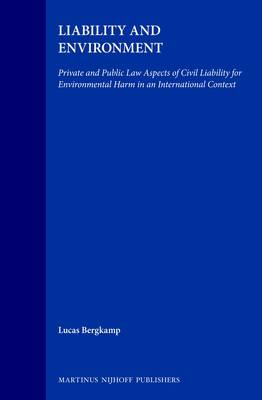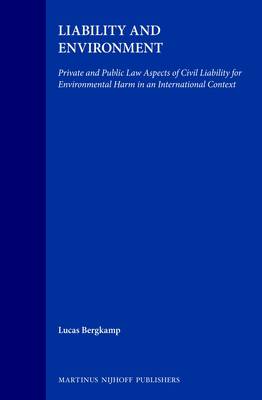
- Retrait gratuit dans votre magasin Club
- 7.000.000 titres dans notre catalogue
- Payer en toute sécurité
- Toujours un magasin près de chez vous
- Retrait gratuit dans votre magasin Club
- 7.000.0000 titres dans notre catalogue
- Payer en toute sécurité
- Toujours un magasin près de chez vous
Liability and Environment
Private and Public Law Aspects of Civil Liability for Environmental Harm in an International Context
Lucas Bergkamp
Livre relié | Anglais
547,95 €
+ 1095 points
Description
Liability and Environment analyzes the role of law, in particular civil liability, in controlling environmental pollution and risk. In modern environmental policy, liability has become a popular instrument. In this book, Prof. Bergkamp takes a fresh look at civil liability for environmental harm in an inter- and transnational context. Over the last decade, industry's liability exposure for environmental harm has expanded significantly. At the international, EC, and national level proposals for onerous strict environmental liability regimes are pending. The `polluter pays principle', which is an articulation of the `cost internalization' theory in the environmental area, is believed to justify such liability regimes. Applying an instrumental approach to legal instruments, Prof. Bergkamp aims to redefine the role of liability in the heavily regulated environmental area. He shows that liability for environmental harm is not justified by the polluter pays principle, is an uncertain and unreliable instrument for achieving prevention, results in an inefficient insurance scheme, and plays a dubious role in adjusting activity levels. Based on an analysis of the basic characteristics of alternative legal instruments, Prof. Bergkamp concludes that civil liability should play a more modest, limited role in an environmental law system dominated by public law. Where deterrence is not the objective, first party insurance, compensation funds, or other public law regimes should be preferred over liability rules.
In addition to civil liability of private parties, Liability and Environment discusses State liability under international, EC, and national law. Under international law, breach of a primary obligation triggers a State's liability. Prof. Bergkamp argues that this rule should be applied also to liability of private parties. In the environmental area, a business' primary obligations are spelled out in detailed permit conditions, regulations, and statutes. According to Prof. Bergkamp, only if a primary obligation is breached, a private person should be liable for environmental harm. The system that Bergkamp advocates is an objective fault liability regime, in which public environmental law defines the standard of care for both government and industry. "In rebuilding our civil liability system, we should keep in mind that what is good for industry should be good for everyone (or it is not good for anyone), we should keep in mind that what is good for private parties should be good for the state (or it is not good for either). In rebuilding our civil liability system, the international law of State responsibility, which is unpolluted by risk spreading and activity level considerations, will guide us a long way."
This book is aimed at advanced law students, academic scholars, and practitioners. In addition, it will be of interest to policy and legislative analysts, legislators, and government officials.
Professor Bergkamp's book cannot be described as "solving" the problems of legal and regulatory control of environmental harm, whether within a nation or internationally. As suggested before, however, the very idea of a "solution" is illusory. All legal and regulatory regimes around the world are today and will remain for the future in a state of perpetually continuing development. The virtue of this fine book is that it moves the process of that development forward by a very substantial measure.
from the Foreword by George L. Priest.
In addition to civil liability of private parties, Liability and Environment discusses State liability under international, EC, and national law. Under international law, breach of a primary obligation triggers a State's liability. Prof. Bergkamp argues that this rule should be applied also to liability of private parties. In the environmental area, a business' primary obligations are spelled out in detailed permit conditions, regulations, and statutes. According to Prof. Bergkamp, only if a primary obligation is breached, a private person should be liable for environmental harm. The system that Bergkamp advocates is an objective fault liability regime, in which public environmental law defines the standard of care for both government and industry. "In rebuilding our civil liability system, we should keep in mind that what is good for industry should be good for everyone (or it is not good for anyone), we should keep in mind that what is good for private parties should be good for the state (or it is not good for either). In rebuilding our civil liability system, the international law of State responsibility, which is unpolluted by risk spreading and activity level considerations, will guide us a long way."
This book is aimed at advanced law students, academic scholars, and practitioners. In addition, it will be of interest to policy and legislative analysts, legislators, and government officials.
Professor Bergkamp's book cannot be described as "solving" the problems of legal and regulatory control of environmental harm, whether within a nation or internationally. As suggested before, however, the very idea of a "solution" is illusory. All legal and regulatory regimes around the world are today and will remain for the future in a state of perpetually continuing development. The virtue of this fine book is that it moves the process of that development forward by a very substantial measure.
from the Foreword by George L. Priest.
Spécifications
Parties prenantes
- Auteur(s) :
- Editeur:
Contenu
- Nombre de pages :
- 736
- Langue:
- Anglais
Caractéristiques
- EAN:
- 9789041116451
- Date de parution :
- 01-10-01
- Format:
- Livre relié
- Format numérique:
- Genaaid
- Dimensions :
- 169 mm x 245 mm
- Poids :
- 1279 g

Les avis
Nous publions uniquement les avis qui respectent les conditions requises. Consultez nos conditions pour les avis.






